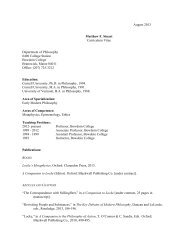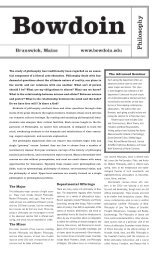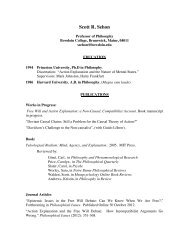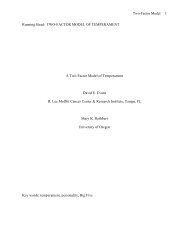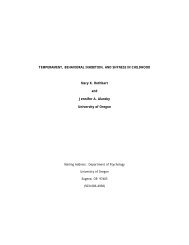Lincoln's Unfinished Work - Bowdoin College
Lincoln's Unfinished Work - Bowdoin College
Lincoln's Unfinished Work - Bowdoin College
You also want an ePaper? Increase the reach of your titles
YUMPU automatically turns print PDFs into web optimized ePapers that Google loves.
Lincoln’s <strong>Unfinished</strong> <strong>Work</strong><br />
Lincoln thus doubly distinguishes itself from the pack: whereas the<br />
unreconstructed Civil War film tradition gestured toward sweeping tales that<br />
spanned from the antebellum period through Reconstruction, Lincoln concerns<br />
itself with a single measure and a few short months. And whereas the<br />
reconstructed Civil War film tradition concentrates on the local and often lowly,<br />
Lincoln sits confidently on its perch atop the halls of power.<br />
Lincoln confounds because of this combination of historical gravitas and<br />
narrow focus. The problem is not what the film does so much as what it doesn't<br />
do. Compressing the subject from freedom writ large to the Thirteenth<br />
Amendment compensates for the risky weight of <strong>Lincoln's</strong> subject. Strictly<br />
delimiting the story insulates the filmmakers from charges that they have missed<br />
something important. "Why did we not deal with X? Because we chose not to<br />
make that film."<br />
This move replicates Spielberg's earlier foray into the realms of nineteenthcentury<br />
antislavery, Amistad, the story of an 1839 slave revolt aboard a Cuban<br />
ship that wound up on New England shores. That film's bizarre elision of<br />
American slavery was made sensible only by the filmmakers' claim that they<br />
sought to tell an accurate story that adhered to a real history — just one that<br />
happened not to be set in the South. How else could one make a film about<br />
antebellum slavery that somehow says almost nothing about the American<br />
slavery? Instead, the film displaced responsibility for slavery onto the decrepit<br />
Old World regime of Spain. In Amistad, the very choice of subject predefined the<br />
parameters of what the film could tackle, in the process effectively side-stepping<br />
the cataclysmic reality of Southern slavery's impact on the entire American<br />
political system.<br />
Similarly, in Lincoln Spielberg lays claim to historical authenticity by defining<br />
his topic tightly — in this instance, the legislative minutiae surrounding a very<br />
selective slice of the story of slavery's ending in the United States. And as with<br />
Amistad, scholarly critics have been left gasping. The film clearly does not work<br />
well to illuminate the concerns of the present generation of scholarship on the<br />
Civil War, which focuses on the innumerable stories of emancipation that Lincoln<br />
decided not to tell.<br />
5<br />
Patrick Rael




